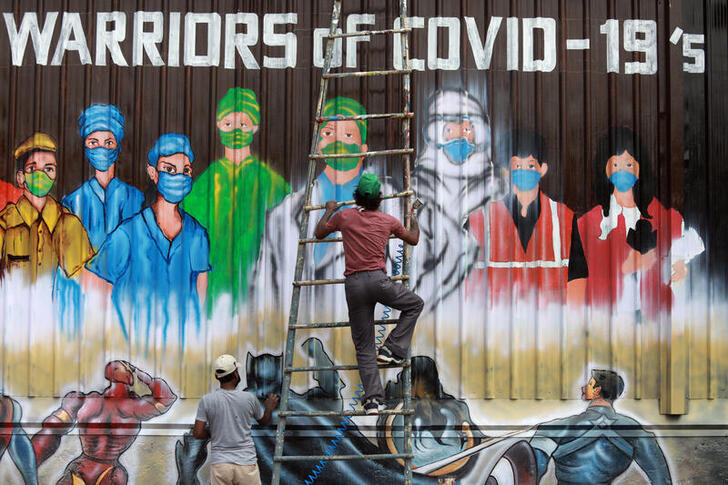Covid Threatens India’s Regional, Global Ambitions: US Think-Tank
Jun 12, 2021 | Pratirodh Bureau
FILE PHOTO: A man gets off a ladder as he completes a mural paying tribute to 'COVID-19 warriors' in New Delhi
India’s domestic challenges due to the COVID-19 crisis have become a threat to its regional and global ambitions, a US think-tank has observed and warned that unless it recovers with the help of allies like the United States, the pandemic could impact the geopolitical balance in the Indo-Pacific.
As such, it is in the United States’ best interests to help India retain its status as a pre-eminent power in South Asia, particularly in view of China’s efforts to bolster its position at the expense of the US and India, it said.
The Hudson Institute think-tank said that at the start of the pandemic, India offered medical assistance to its immediate neighbours and followed vaccine diplomacy in the first three months of 2021, which helped India to project itself as a regional leader, advancing its claim of being a global power in waiting.
“There was optimism that India would be able to counter China’s soft power with its own. Now, however, at least over the short term, India’s domestic challenges have become a threat to its regional and global ambitions,” wrote Husain Haqqani, a former Pakistani Ambassador to Sri Lanka and the US, and Hudson research scholar Aparna Pande.
Haqqani is currently the director of South and Central Asia at the Hudson Institute. Pande is director, Initiative on the Future of India and South Asia at the think-tank.
“The recent surge of COVID-19 in South Asia challenges India’s traditional ability to aid its smaller neighbours, a change that could, in turn, affect India’s influence in its competition with China. Unless India can recover from this surge with the help of allies like the United States, the pandemic could impact the Indo-Pacific’s geopolitical balance,” the joint policy memo released by Hudson stated.
In the first phase of the COVID-19 pandemic, India succeeded in occupying the role of a regional leader. But official complacency, disinclination on the part of government leaders to accept the advice of scientific advisors and reluctance to ramp up vaccine production and distribution has seriously damaged India’s standing, the think-tank report said.
Haqqani and Pande wrote that a year-and-a-half after the start of the COVID-19 pandemic, China’s footprint in South Asia is larger than it was before. Both Pakistan and Sri Lanka are deeply in debt to China, having borrowed heavily from it due to the pandemic.
“Unless India, the United States, and the financial institutions led by the democracies provide support, the Maldives and Nepal may also turn towards China for assistance,” they warned.
Bipartisan support within the US policy community for India has already mobilised Americans to help India. The Joe Biden administration has sent oxygen concentrators, medicines, testing kits, ventilators, and personal protective equipment to India, and many US companies and the Indian-American community have rallied to India’s support, the think-tank report stated.
The Hudson Institute recommended the Biden Administration offers Covid vaccine doses to India and other countries in need of them. In the short term, one way to help India’s economy recover from the impact of the COVID-19 pandemic would be to reinstate India’s Generalized Scheme of Preferences Plus status, which the Donald Trump administration removed.
“A mini-trade deal could be offered to signal American support for India’s economic recovery,” the policy memo said.
Noting that India’s economy underwent its first recession in 2020, contracting by 10 per cent, it said encouragement for American companies and those of other countries such as Japan, South Korea and Taiwan, that are moving out of China, to invest in India would also aid the country in restoring its economic growth.
It recommended the Indian government enforces smart lockdowns, engages in vaccine diplomacy and also bolsters “Quad” diplomacy.
